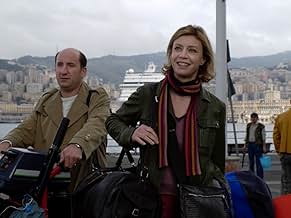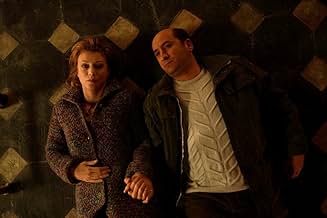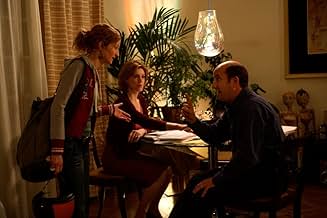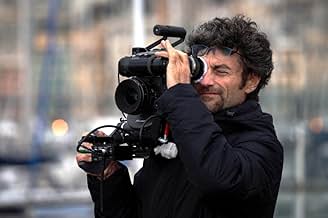IMDb RATING
6.9/10
2.3K
YOUR RATING
A well-off and sophisticated couple struggles to stay together after the husband loses his job.A well-off and sophisticated couple struggles to stay together after the husband loses his job.A well-off and sophisticated couple struggles to stay together after the husband loses his job.
- Awards
- 6 wins & 35 nominations total
Storyline
Did you know
- TriviaOrietta Notari's debut.
- SoundtracksSono Tremendo
Written by Giosy Capuano (as G.Capuano), Mario Capuano (as M.Capuano) and Danilo Ciotti (as A.D.Ciotti)
© Edizioni Chappell, S.r.l. / Fonit Cetra Music Publishing, S.r.l.
Performed by Pivio & Tuscolano Brothers
Courtesy of Warner-Chappell Music (Italiana), S.r.l.
Featured review
In this film about work and marriage by 'Bread and Tulips'director Silvio Soldini, a well-off Genoa couple has to face self-image, marriage, and work problems when their financial world crumbles. Right after Elsa (Margherita Buy of The Unknown Woman) passes her graduate exams in art history and her husband and friends give her a big surprise party to celebrate, the truth comes out. Michele (Antonio Albanese) reluctantly reveals to his wife that due to hard times, corporate restructuring, and his own stubbornness he's been pushed out of the firm he co-founded with Roberto (Alberto Giusta) and hasn't been working or receiving a salary for months. They're in debt. Everything has to change now.
First off Elsa is furious at Michele for not telling her all this sooner. His judgment was that knowing would have made it hard for her to finish her graduate work, but now that she has to know, it angers her to have been lied to. Probably he was lying to himself, but he's forgotten that marriage is a partnership.
Neither Elsa nor Michele knows how to adjust. One night they go out to dinner with friends and Michele insists on paying, even though the bill is over $300. Again Elsa is furious. Later, she finds it impossible to speak frankly to her best friend, Nadia (Carla Signoris). It pains her to confront people now that one by one their status symbols are being removed. In the face of loss, there's the typical denial. Everything seems shaky.
Whether they're getting along or not, their beautiful apartment must be sold. Their maid, Daisy, must go to take a full time job, and they have to sell something to raise the money for her severance pay. Elsa has to give up her art restoration project--which was an adjunct to her graduate work and her passion but was unsalaried--and find a part-time job in telemarketing and in the evenings fill in as secretary to a shipping company boss. They haven't told their grown daughter Alice (Alba Rohrwacher) about any of this. Relations with Alice are painful because Michele doesn't approve of Ricky (Fabio Troiano), the boyfriend she lives with. Later he is to get down off his high horse when he learns Ricky's not such a bad guy. For now, they haven't told Alice.
Michele looks for work, but has a hard time accepting offers that are, inevitably, all below what he's been used to. (This is another form of denial.) One day he's desperate to do something, anything. He takes a day job through an employment office delivering packages on a motorbike--and Alice sees him. So she finds out. Alice has previously used the money her parents had given her for university to open a restaurant. It's doing fine, and she works there. Alice is torn between anger at Michele and serious concern for her parents.
Michele has failed to take what turns out to be the best offer he's going to get, so he falls into something utterly humble but somehow satisfying, because it's physical. He does minor rehab work with two of his former employees, Vito (Giuseppe Battiston) and Luciano (Antonio Carlo Francini), who were let go by his firm before he was. Signor Salviati (Paolo Sassanelli), the shipping boss Elsa secretaries for in the evenings, has a weakness for her and keeps flirting. His attentions are all the more tempting with things so rocky in her marriage, but she still resists--mostly. Michele gets increasingly depressed when Vito and Luciano get hired back in the shipping industry and he can't finish their rehab jobs on his own and no longer has their company. Now he doesn't even go to interviews and he has nothing to do but mope.
This little Italian film's hard lesson--that economic disaster can happen to anybody--comes at all too good a time for an American audience. The question the film subliminally asks is to what extent relationships, sense of self, and peace of mind may all rest on a lifestyle--how much economic security or its absence can change everything. Now that Elsa and Michele's "days" are full of "clouds" and their nerves are on edge (and Elsa is exhausted from her new make-do jobs), they get into fights easily. It's not certain their marriage will survive. After a fight, Michele sleeps over one night with Ricky and Alice. This is when he sees that Ricky's a good guy. It's also clear now they're lucky Alice has made herself financially independent.
Elsa's restoration project, which we see her presenting during the opening credits, involves unearthing a fresco that may be the work of an early renaissance painter she's interested in. Toward the end of the film, she returns to the project and finds that her intuitions were correct. She's vindicated, her professor is admiring, and this becomes a metaphor for discovering a future. In the final scene, Elsa and Michele agree to forget the past and move forward as best they can. Their losses have taken them back to basics and to honesty with each other and their daughter.
While this starts with a premise like that of Laurent Cantet's 'Time Out' of a man hiding that he's been pushed out of the corporate world, the development here is much more practical and everyday. The film succeeds because of a lack of tricky plot developments, and the charisma and polish of Buy and Albanese. Soldini does a splendid job of evoking the upper-middle-class lifestyle the couple lives in Genoa. Events are nerve-wracking because they're living so much on the edge. This is probably a more common situation than it used to be. It's not very hard to identify with the couple and feel the day-to-day insecurity they suddenly live with. The security blanket is easily ripped. In a world of globalization and ever more rapacious capitalism, the upper bourgeoisie is yet another new proletariat, and 'Days and Clouds' is a sympathetic portrayal of what that may mean.
First off Elsa is furious at Michele for not telling her all this sooner. His judgment was that knowing would have made it hard for her to finish her graduate work, but now that she has to know, it angers her to have been lied to. Probably he was lying to himself, but he's forgotten that marriage is a partnership.
Neither Elsa nor Michele knows how to adjust. One night they go out to dinner with friends and Michele insists on paying, even though the bill is over $300. Again Elsa is furious. Later, she finds it impossible to speak frankly to her best friend, Nadia (Carla Signoris). It pains her to confront people now that one by one their status symbols are being removed. In the face of loss, there's the typical denial. Everything seems shaky.
Whether they're getting along or not, their beautiful apartment must be sold. Their maid, Daisy, must go to take a full time job, and they have to sell something to raise the money for her severance pay. Elsa has to give up her art restoration project--which was an adjunct to her graduate work and her passion but was unsalaried--and find a part-time job in telemarketing and in the evenings fill in as secretary to a shipping company boss. They haven't told their grown daughter Alice (Alba Rohrwacher) about any of this. Relations with Alice are painful because Michele doesn't approve of Ricky (Fabio Troiano), the boyfriend she lives with. Later he is to get down off his high horse when he learns Ricky's not such a bad guy. For now, they haven't told Alice.
Michele looks for work, but has a hard time accepting offers that are, inevitably, all below what he's been used to. (This is another form of denial.) One day he's desperate to do something, anything. He takes a day job through an employment office delivering packages on a motorbike--and Alice sees him. So she finds out. Alice has previously used the money her parents had given her for university to open a restaurant. It's doing fine, and she works there. Alice is torn between anger at Michele and serious concern for her parents.
Michele has failed to take what turns out to be the best offer he's going to get, so he falls into something utterly humble but somehow satisfying, because it's physical. He does minor rehab work with two of his former employees, Vito (Giuseppe Battiston) and Luciano (Antonio Carlo Francini), who were let go by his firm before he was. Signor Salviati (Paolo Sassanelli), the shipping boss Elsa secretaries for in the evenings, has a weakness for her and keeps flirting. His attentions are all the more tempting with things so rocky in her marriage, but she still resists--mostly. Michele gets increasingly depressed when Vito and Luciano get hired back in the shipping industry and he can't finish their rehab jobs on his own and no longer has their company. Now he doesn't even go to interviews and he has nothing to do but mope.
This little Italian film's hard lesson--that economic disaster can happen to anybody--comes at all too good a time for an American audience. The question the film subliminally asks is to what extent relationships, sense of self, and peace of mind may all rest on a lifestyle--how much economic security or its absence can change everything. Now that Elsa and Michele's "days" are full of "clouds" and their nerves are on edge (and Elsa is exhausted from her new make-do jobs), they get into fights easily. It's not certain their marriage will survive. After a fight, Michele sleeps over one night with Ricky and Alice. This is when he sees that Ricky's a good guy. It's also clear now they're lucky Alice has made herself financially independent.
Elsa's restoration project, which we see her presenting during the opening credits, involves unearthing a fresco that may be the work of an early renaissance painter she's interested in. Toward the end of the film, she returns to the project and finds that her intuitions were correct. She's vindicated, her professor is admiring, and this becomes a metaphor for discovering a future. In the final scene, Elsa and Michele agree to forget the past and move forward as best they can. Their losses have taken them back to basics and to honesty with each other and their daughter.
While this starts with a premise like that of Laurent Cantet's 'Time Out' of a man hiding that he's been pushed out of the corporate world, the development here is much more practical and everyday. The film succeeds because of a lack of tricky plot developments, and the charisma and polish of Buy and Albanese. Soldini does a splendid job of evoking the upper-middle-class lifestyle the couple lives in Genoa. Events are nerve-wracking because they're living so much on the edge. This is probably a more common situation than it used to be. It's not very hard to identify with the couple and feel the day-to-day insecurity they suddenly live with. The security blanket is easily ripped. In a world of globalization and ever more rapacious capitalism, the upper bourgeoisie is yet another new proletariat, and 'Days and Clouds' is a sympathetic portrayal of what that may mean.
- Chris Knipp
- Jun 9, 2008
- Permalink
Details
Box office
- Budget
- €300,000 (estimated)
- Gross US & Canada
- $112,102
- Opening weekend US & Canada
- $16,707
- Jul 13, 2008
- Gross worldwide
- $6,966,224
- Runtime1 hour 58 minutes
- Color
- Sound mix
- Aspect ratio
- 1.85 : 1
Contribute to this page
Suggest an edit or add missing content





























